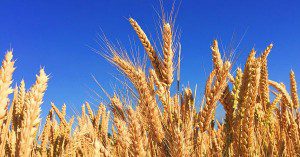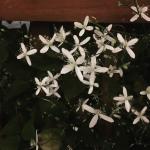I have been unfortunate, lately, to be constantly running into the word “flourishing.” It is not technically a bad word, although I am including it in my Association of Bad Words anyway, because of its ubiquity amongst Christians at the moment. No matter where you go, there it is. And also because it has come to mean something it doesn’t really mean. If you have used the word “flourish” in the last twenty-four hours, I forgive you. I caught myself using it this week. I had to choke it back and look around for some other expression, which I was unable to find.
Flourish, as you know, means, according to my dictionary app, to thrive, to prosper, to grow luxuriously like a plant, to be in a vigorous state. It can also mean to brandish, or to inordinately cast about on your trumpet, looking around for the melody, but those two meanings we will leave aside for the moment.
Everyone, of course, wants to flourish. Getting to have more is lots more interesting and exciting than finding yourself coping with less and less, with little pathetic piles of dust instead of big glorious boxes emblazoned with Amazon Prime. When John the Baptist’s disciples, as I must have mentioned last week, heard that he had to decrease, and go on decreasing, they became despondent and depressed. It was not the flourishing they had so looked forward to.
But I think the interesting thing about the word “flourish” at least the way Christians use it, is that we’re not meaning to use it in a material, consumeristic sense. We mean some inner spiritual quality. We both want to flourish ourselves, but even more, we are anxious about the flourishing, or, more precisely, the growth of others. The Christian is supposed to grow, spiritually.
A central image, indeed, for Christians, because it is found in the Bible, is the Vine. We are branches growing on the Vine, who is Jesus. Our lives are sustained by his. There isn’t supposed to be a moment where you say, ‘well, that was him, but now, this is me, look how well I’m doing and how brilliant I am.’ The life blood of the Christian, the sap if you will, is the life of Jesus. And if that’s so, then that person is growing. There is not a stagnation, a sitting around doing nothing and becoming nothing. There is dynamic growth in a personal, spiritual, though often hidden way.
The trouble comes when you try to divine what the growth is and if it is good or not. There are all kinds of luxurious plants in my garden right now, but I didn’t mean for a lot of them to be there. They are lush, but they are obnoxious and are ticking me off. After church today I’m going to hobble out and yank them out of the ground and cast them into my rubbish heap, praying that they will die forever and not leave any remains behind them to clutter up my serenely flourishing roses.
The progressive Christian likes to say, ‘look at the fruit,’ and, ‘look at the flourishing!’ A good plant can’t produce bad fruit, and look how good that fruit is. Those two men living together in boring complacency roasting their chicken and folding their laundry are obviously flourishing. Look how happy they are. Look how normal and quiet their lives. The fruit tells you how good it is.
Which is a risible misreading of the text. Because Jesus said, ‘a bad tree can’t produce good fruit.’ You’re not supposed to look at the fruit, you’re supposed to look at the tree. Is it an obedient tree? Is the tree planted by a cool stream of water? Or is it tripping along lightly down the broad road of destruction, catching up with sinners, sitting down to relish the company of the wicked. Goodness, there are So Many trees in the Bible. And what was that ancient tree? That poor woman looked at the fruit and it was so beautiful. She saw that it was a delight to the eyes and it would surely make her wise. She just wanted to flourish, to grow in knowing things, to become her true self.
John’s disciples try to peer in through the bars of his prison to find out how he is making out and discover he has decreased to such an extent that he is no longer there. He has been killed.
Which is the other terrible thing that Jesus says. ‘Truly, truly, I say to you, unless a grain of wheat falls into the earth and dies, it remains alone; but if it dies, it bears much fruit.’ Which is a curious and harrowing kind of growth. To die first, and then go on dying in a decreasing and painful sort of way. John, in this case, must have been the most flourishing, the most fruitful of all. Or the person who lives alone in sorrowful obedience, walking the narrow way that leads to salvation, eating the meager and disappointing manna day after day while everyone else is feasting on leaks and garlic.
Don’t look at the fruit. Look at the Tree. No, not yourself. The one hanging on the tree. The source of life, the bread, the wine, the water, the truth. The human heart and works are a jumble. Some of them are really good, some of them are awful, and it changes by moments. The one who tells the truth one minute will lie the next. The one who mortified the desires of the flesh today will tomorrow abuse and destroy his neighbor. The one who gives freely of herself over coffee hour will shatter like a brittle piece of glass two hours later at the dinner table.
Can we say, then, that she is not flourishing? Because she does not go from strength to strength? Because when you peer at her you can see that she isn’t making any progress in her Christian life at all? Or perhaps you might look at the Tree, at the one to whom she clings no matter what. Or he. Jesus is for everyone after all.
See you in church!













